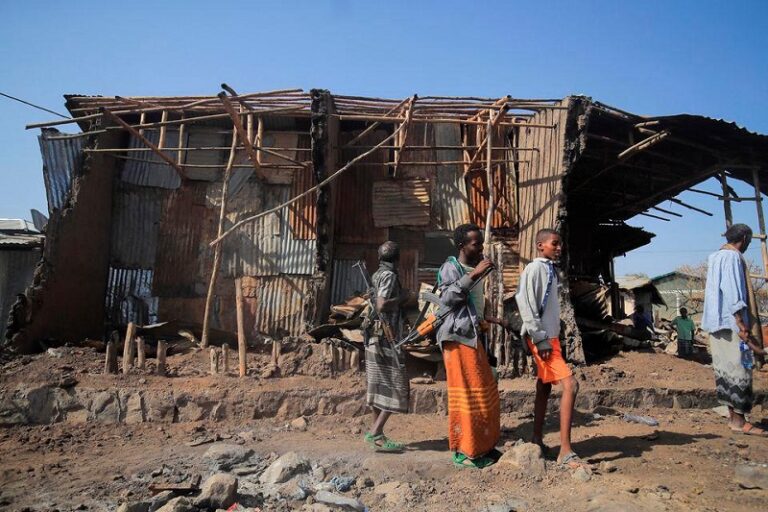

ethiopian rebels from tigray will take part in peace talks in south africa
Last updated on October 22nd, 2022 at 03:26 pm
The rebel authorities in Ethiopia’s Tigray region have confirmed that they will be attending the peace talks that are scheduled to take place in South Africa on Monday under the supervision of the African Union (AU). These talks are intended to bring an end to the conflict that has been going on in the north of the country for the past two years.
Kindeya Gebrehiwot, a spokesman for both sides, told AFP in a message that “it is the first time that the Ethiopian federal government has taken the lead in the negotiations.” Gebrehiwot was referring to the fact that the Ethiopian federal government had taken the lead role in the negotiations for the very first time. The Ethiopian federal government, led by Prime Minister Abiy Ahmed, which has been at war with the rebel authorities in Tigray since November 2020, announced on Thursday that it would participate in the talks. However, neither the African Union (AU), which is headquartered in Addis Ababa, nor Pretoria, has announced this officially as of yet. The conflict in Tigray has been ongoing since November 2020.
Previous negotiations, which had been held by the AU at the beginning of October in South Africa, had stalled out before they even started because of organizational issues. Olusegun Obasanjo, a former president of Nigeria who is currently serving as the AU High Representative for the Horn of Africa, briefed the Peace and Security Council (PSC) of the pan-African organization “on the peace process for Ethiopia” on Friday. Obasanjo is leading the efforts to mediate the conflict in Ethiopia.
This meeting, behind closed doors of the PSC, the body in charge of conflicts and security issues within the pan-African organization, was the first since the resumption of fighting on August 24 in northern Ethiopia, which had ended a five-month truce and the meager hopes of talks that it had raised. The meeting was held after the resumption of fighting in northern Ethiopia on August 24.
It was not immediately made public what Mr. Obasanjo was going to say in his address. According to a statement made by Ned Price, a spokesperson for the State Department in Washington, the United Nations Security Council is also scheduled to convene on Friday to examine the current situation in Ethiopia. This meeting will also take place behind closed doors.
Both meetings “illustrate the international community’s great concern about the situation in northern Ethiopia,” he added. On Thursday, Mr. Abiy told people at the opening of a school in Addis Ababa that the conflict in northern Ethiopia would “end and peace will prevail.”
“We are not going to continue fighting forever,” he added, but he did not mention the planned discussions in South Africa, which took place while the Ethiopian army and its allies just increased their onslaught in Tigray. “We are not going to continue fighting indefinitely,” he said.
In recent days, the international community has expressed concern over the recent escalation of fighting in Tigray, which is being pinned down by Ethiopian federal forces, supported in the north by the army of Eritrea, which is the country that borders Tigray in the north, and supported in the south by troops from neighboring Ethiopian regions. The fighting in Tigray is being pinned down by Ethiopian federal forces, supported in the north by the army of Eritrea, which is the country that borders Tigray.
After several days of bombing, Ethiopian and Eritrean forces took control of Shire, one of the most important towns in the Tigray region. The Shire had a population of approximately 100,000 prior to the war and was home to a large number of people who had been forced to flee their homes as a result of the conflict.
A humanitarian source who requested anonymity told AFP on Friday that significant fighting was taking place in Selekelka, which is midway between Shire and Aksum. The source cited “a push” by Ethiopian and Eritrean forces towards this other important town in Tigray, which is home to a World Heritage site.
Price stated that US special envoy for the Horn of Africa, Mike Hammer, had been in Addis Ababa for several days “supporting AU efforts to open the discussions.” Washington “wants to see the negotiations begin as soon as feasible,” according to Price. A spokesman for the U.S. government said that Mr. Hammer “is in regular contact with the parties involved, including those who plan to participate in the mediation, especially Kenya and South Africa.”
The Oklahoma City Thunder secured their tenth consecutive victory by beating the Chicago Bulls 145-117. This victory raised their season…
Rob Walter Resigns his Position as coach for the Proteas men's team for white-ball games because personal problems needed attention.…
Starting April 2, South African drivers will get lower costs when filling their tanks as fuel prices decrease for all…
The U.S.-based driver training company Zutobi analyzed road safety worldwide and found South Africa stays last in driving danger since…
The Basketball Africa League (BAL) returns for its 2025 season with exciting changes and developments. Since 2019 the NBA-linked basketball…
The Somali president supports their military forces to eliminate the threats from Al-Shabaab, ISIS, and Al-Qaeda. The Somali National Army…
This website uses cookies.